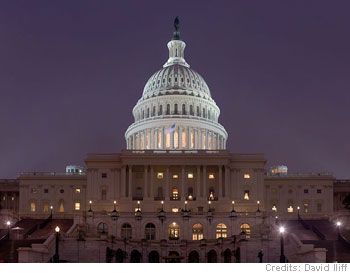 Congressional negotiators today approved the most sweeping rewrite of the nation’s financial system rules since the 1930s.
Congressional negotiators today approved the most sweeping rewrite of the nation’s financial system rules since the 1930s.
After a marathon 20-hour session of rancorous negotiations, lawmakers from the House and Senate arrived at a compromise combining elements of draft bills passed in the House of Representatives and the Senate.
On a party-line vote, the House negotiators voted 20 – 11 and the Senate conferees voted 7 – 5 to approve the bill which is expected to have enough support to become law. Both chambers plan to vote next week.
Here is a brief look at the bill’s main provisions:
Reuters: “SWAPS PUSH-OUT: Wall Street firms that dominate the $615-trillion over-the-counter derivatives market would have to spin off dealing operations in some swaps, but could keep many swaps in-house, including derivatives to hedge their own risk.
Much OTC derivatives trading would be redirected through more accountable channels such as exchanges and clearinghouses. Many OTC contracts end-users could carry on as before.
VOLCKER RULE: A new rule would bar proprietary trading by banks for their own accounts unrelated to customers; limit the growth of the biggest banks; and curb banks’ involvement in private equity and hedge funds, except for small investments allowed by a loophole added to the rule late in debate.
Some big banks’ profits would be pinched by both the Volcker rule and the Lincoln swaps plan, with a few Wall Street giants potentially facing structural changes.
WALL ST ‘DEATH PANEL’: Aiming to prevent massive bailouts like AIG’s and disastrous bankruptcies like Lehman Brothers’, the bill calls for a new government “orderly liquidation” process for financial firms on the verge of collapse.
Authorities could seize and liquidate them, with costs covered by sales of assets and fees on other firms if needed.
CONSUMER WATCHDOG: Protection of financial consumers would be enhanced by increased government regulation.
The bill would set up a new bureau in the Federal Reserve to regulate mortgages and credit cards. The watchdog has sharp teeth, but couldn’t bite car dealers, who won an exemption.
THE BIG PICTURE: A new council of federal regulators would try to monitor the entire financial forest, not just the trees. High-risk firms could be singled out for stricter policing.
BEHIND THE HEDGE: Private equity and hedge funds would have to register with regulators and open their books to scrutiny. Not so for venture capital funds, which would be exempt.
INSURANCE COPS: The first federal monitor for state-policed insurers would be formed. It’s not federal regulation — yet.
BANK CUSHIONS: Banks would have to set aside more capital to ride out tough times, but will get several years to comply.
FED SCRUTINY: The Fed’s emergency lending during the crisis would be reviewed, but not its decisions on interest rates.
DEBIT CARDS: Fees charged on debit card transactions would be reduced — a victory for retailers over the banks.”
- Bulenox: Get 45% to 91% OFF ... Use Discount Code: UNO
- Risk Our Money Not Yours | Get 50% to 90% OFF ... Use Discount Code: MMBVBKSM
Disclaimer: This page contains affiliate links. If you choose to make a purchase after clicking a link, we may receive a commission at no additional cost to you. Thank you for your support!

Leave a Reply